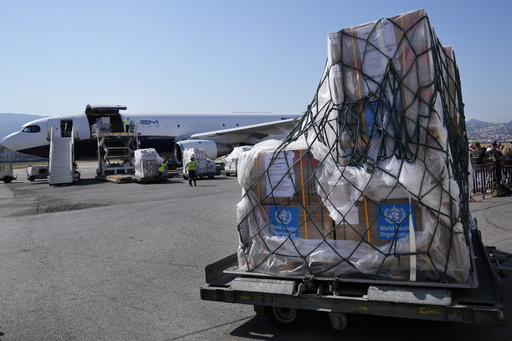
GENEVA — The head of the World Health Organization (WHO) has urged global leaders to persuade the United States to reconsider its withdrawal from the health agency, highlighting potential gaps in crucial information related to worldwide disease outbreaks. This appeal was made during a private meeting with diplomats last week, emphasizing that the absence of U.S. involvement could lead to significant consequences, particularly in handling global health crises.
Concerns surrounding the U.S. departure were raised during a vital budget discussion on Wednesday, where countries sought clarification on how WHO would manage the implications of losing its largest financial backer. German envoy Bjorn Kummel cautioned attendees by stating, “The roof is on fire, and we need to stop the fire as soon as possible.” The U.S. contributed approximately $988 million for the 2024-2025 period, accounting for about 14% of WHO’s total budget of $6.9 billion.
Budget documents from the meeting indicated that many of WHO’s health emergency initiatives are heavily reliant on U.S. funding. For example, more than 80% of the preparedness efforts in WHO’s Europe office depend on the $154 million contributed by the U.S. Moreover, the funding from the U.S. is essential for many significant emergency operations, covering up to 40% of some programs. A potential shortfall in these funds could jeopardize responses to urgent health situations in the Middle East, Ukraine, and Sudan, as well as disrupt polio-eradication and HIV programs.
In addition, the U.S. finances 95% of WHO’s tuberculosis work in Europe, along with significant portions of TB-related efforts in Africa and the Western Pacific. At a separate discussion regarding the financial repercussions of the U.S. exit, WHO finance director George Kyriacou noted that if spendings continue as they are, WHO might find itself in a precarious financial position by early 2026. He elaborated that they are unwilling to continue spending at the current rate, and since Trump’s executive order, WHO has sought to reclaim funds for previous costs from the U.S., though many requests were not accepted.
The finance director mentioned that the U.S. has not yet settled its financial obligations for 2024, further compounding WHO’s financial challenges. The WHO’s executive board, composed of 34 prominent representatives, is anticipated to discuss budgetary issues throughout its current session, which spans until February 11.
Additionally, just last week, officials at the Centers for Disease Control and Prevention (CDC) in the U.S. were directed to halt collaboration with WHO immediately. WHO’s Director-General Tedros Adhanom Ghebreyesus informed budget meeting attendees that despite the strained relationship, the agency still provides U.S. scientists with vital data, although the specifics of this information remain unclear. Tedros expressed the need for member nations to reach out to U.S. officials to advocate for reconsideration of the withdrawal.
In the midst of various health emergencies, WHO is currently striving to manage outbreaks of the Marburg virus in Tanzania, Ebola in Uganda, and mpox in Congo. Tedros contested the justifications presented by Trump for the U.S. withdrawal, which included assertions that WHO mishandled the COVID-19 pandemic, failed to implement necessary reforms, and imposed “unfairly onerous payments” on member states. According to Tedros, WHO promptly informed the world about the COVID-19 threat in January 2020 and has since undergone numerous reforms aimed at expanding its funding base.
The director-general expressed his conviction that the U.S. departure is more about the impending void in vital outbreak data rather than mere financial implications. He underscored the importance of reintegrating the U.S. within WHO, asserting that all member states could play a role in facilitating this process. Meanwhile, Kummel described the U.S. exit as an unprecedented crisis for WHO, raising concerns about the tangible consequences if U.S. funding is cut.
Various nations, including Bangladesh and France, sought clarity on WHO’s strategic plans to manage the financial loss and which health programs might face cuts. Internal documents disclosed among WHO senior managers outlined possible scenarios, including halving the budget of major departments by year’s end. WHO has not confirmed whether Tedros encouraged member nations to lobby on behalf of the agency.
While some analysts view the U.S. exit as a critical challenge, others see it as an opportunity to reassess global public health strategies. Matthew Kavanagh from Georgetown University emphasized that less than 1% of the U.S. health budget goes to WHO, and in return, the U.S. receives substantial benefits, including valuable information about global health threats and access to virus samples crucial for vaccine development. He described WHO as significantly underfunded, with contributions from wealthy nations likened to “peanuts.”
Dr. Michael Ryan, WHO’s emergencies chief, acknowledged the detrimental impact of losing U.S. collaboration but highlighted the capacity of member states to compensate for these gaps. He remarked that the U.S. is essentially withdrawing from a community of nations. Kavanagh expressed skepticism about whether the U.S. could replicate WHO’s capability to monitor emerging health dangers globally, warning that this withdrawal could lead to poorer health outcomes for Americans in the long run. “How much worse remains to be seen,” he concluded.

